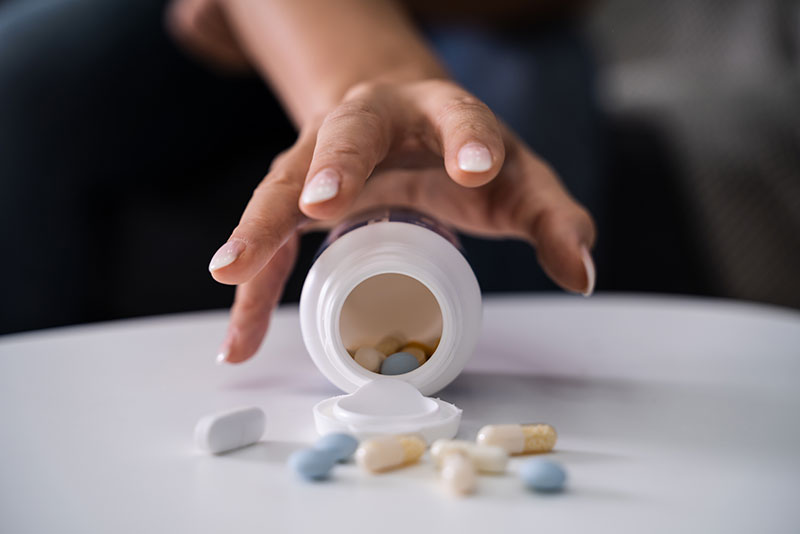Opioid addiction is a serious public health issue across the United States. The opioid epidemic may not get as much media attention now as it used to. But in many ways, opioid addiction is as dire as ever. This is largely due to the rise and spread of fentanyl, which is one of the most powerful synthetic opioids available today. Fentanyl overdoses account for a considerable number of deaths each year.
Learning the signs of opioid addiction means you will be prepared to intervene for a loved one before it is too late. It truly could be a matter of life and death—contact 844.904.3485 to learn more about opioid addiction treatment in Athens, GA at Serenity Grove.
What Are Opioids?
Before diving into the common signs of opioid addiction, it’s worth clarifying what opioids are. If you don’t understand opioids as a category of drug, you won’t be able to identify the signs of opioid addiction.
The term opioid does not refer to any specific drug. Instead, it is an umbrella term for a class of drugs that relieve pain. Some of these can be obtained through a valid prescription, while others only exist illicitly, such as heroin. While opioids have legitimate medical use, they are among the most abused drugs in the United States today. The following is a list of commonly prescribed and abused opioid drugs:
- Fentanyl
- Hydrocodone
- Oxycodone
- Morphine
- Codeine
- Methadone
5 Signs of Opioid Addiction
What are the signs of opioid addiction? Many different signs of opioid addiction exist, with some presenting as more obvious than others. Be on the lookout for these five signs of opioid addiction so that you can promptly intervene on behalf of a loved one.
1. Financial Hardship
Acquiring opioids illicitly is expensive. People who abuse opioids may find the cost outstripping even good wages from a job. This often leads people into financial hardship. Once someone becomes dependent on opioids, the drug tends to exert more pull on them than the idea of financial solvency.
Since addiction remains stigmatized, these financial hardships may not have an obvious source. Your loved one may try to hide where all their money is going as they skip out on paying bills or constantly seem strapped for cash.
2. Changing Social Circles
Another common sign of opioid addiction is a change in your loved one’s social circle. They may begin to hang out with new people, they may avoid people they used to hang out with, or they may start visiting certain hangout spots that seem odd for them. The changes in their social circles will be in response to needing to access a supply of opioids regularly.
Don’t feel like you have to monitor your loved one closely. But it is worth paying attention to if their friend group changes overnight or their usual weekend hangouts are suddenly in new places.
3. Mood or Behavior Changes
Abusing opioids inevitably changes mood and behavior. The behaviors may not always be outwardly negative. For instance, someone who recently took opioids may seem euphoric or extremely positive. Look for uncharacteristic behavior that is out of sorts from who you know your loved one to be.
4. Drug Paraphernalia
Many types of drug paraphernalia are common household items. So it’s not enough with this sign to simply identify their presence. Much also depends on how a person chooses to use an opioid. Nonetheless, you should watch out for peculiarity in where and how much of these items your loved one has. Things like needles, aluminum foil, pipes, cotton balls, and spoons are all examples of opioid drug paraphernalia, depending on how someone is using the drugs.
5. Withdrawal Symptoms
One of the most telling signs of opioid addiction is withdrawal symptoms. For people who abuse opioids regularly, withdrawal symptoms can set in quickly between instances of drug use. Opioid withdrawal symptoms include anxiety, agitation, muscle aches, headaches, and sleep issues.
Why Getting Help for Opioid Addiction Is So Important
Getting help for opioid addiction is an important step to take in order to achieve a healthier, more fulfilling life. Opioid addiction has serious physical and mental health consequences, which can result in decreased quality of life and potentially death if left untreated. In addition to the physical risks, opioid addiction often results in financial hardship due to increased expenses associated with purchasing drugs and reduced income from job loss or decreased productivity at work. It can also have social costs, such as straining relationships with family members or friends. Furthermore, untreated opioid addiction can lead to involvement in criminal activities such as theft or drug dealing to obtain money for drugs.
Seeking professional help for opioid addiction is essential because it provides individuals with access to resources that are proven to be effective in treating opioid addiction. Treatment programs often include medication-assisted treatment, which utilizes FDA-approved medications like Naltrexone, Vivitrol, and Sublocade to help reduce cravings and withdrawal symptoms associated with opioid use. They also provide counseling services such as cognitive behavioral therapy and other evidence-based therapies that are designed to address the psychological components of addiction, which can lead to more successful long-term outcomes. Finally, many treatment centers offer support groups that provide an additional layer of emotional support during recovery from opioid abuse.
Overall, getting professional help for opioid addiction is a crucial step in regaining control of one’s life and achieving lasting health and wellness. With the proper resources and support, individuals can overcome their opioid addiction and reclaim their lives.
Find Treatment For Opioid Addiction Near You at Serenity Grove
Have you identified multiple signs of opioid addiction in someone you love? If you answered yes, the best thing to do is to connect them with high-quality treatment through a treatment center like Serenity Grove. Call 844.904.3485 or fill out our online contact form to learn how we can help your loved one overcome opioid addiction today.


